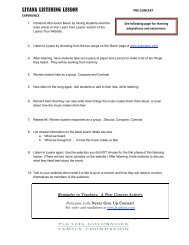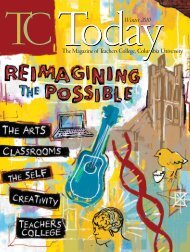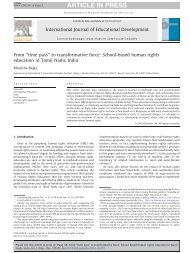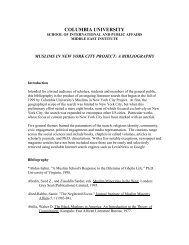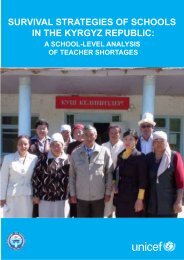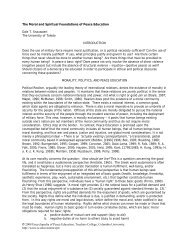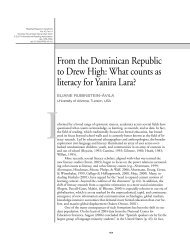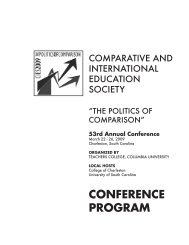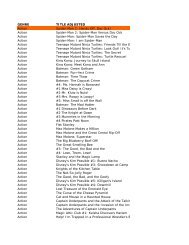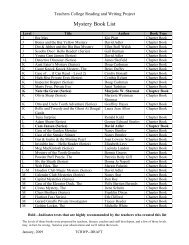TC Today - Teachers College Columbia University
TC Today - Teachers College Columbia University
TC Today - Teachers College Columbia University
You also want an ePaper? Increase the reach of your titles
YUMPU automatically turns print PDFs into web optimized ePapers that Google loves.
The Naturalist<br />
Giving Peas a Chance<br />
Christiane Baker got interested in food when her mom stopped cooking.<br />
Now she’s a leader in garden-based nutrition education for kids<br />
On the eve of the launch event for Edible Schoolyard<br />
NYC, Christiane Baker, the organization’s director,<br />
was alone in the kitchen of P.S. 216 in Gravesend,<br />
Brooklyn, washing more than 1,000 organic apples.<br />
It was par for the course for a woman—and an organization—<br />
whose mission is to teach that food isn’t just a commodity<br />
that appears on our plates.<br />
Under Baker, a part-time student in <strong>TC</strong>’s Nutrition Education<br />
master’s degree program, Edible Schoolyard NYC, a teaching<br />
garden located at P.S. 216 (the Arturo Toscanini Elementary<br />
School), is partnering with the <strong>College</strong> on a kitchen and garden-themed<br />
curricula that will enable children to enhance<br />
their learning in areas such as math, reading and art.<br />
Kids get to participate in the<br />
magic. They participate in the<br />
whole cycle of food.<br />
“Instead of the old slogan, ‘Reading, Writing and<br />
Arithmetic,’ we want to change it to, ‘Eating, Reading,<br />
Writing, Arithmetic,’” says Baker.<br />
Edible Schoolyard was founded in Berkeley, California,<br />
by famed Chez Panisse chef and organic food activist<br />
Alice Waters. There are now affiliates in Los Angeles, New<br />
Orleans and Greensboro, North Carolina, but New York City’s<br />
chapter—a half-acre of land that was transformed into<br />
crop-ready soil this past fall—is the organization’s first<br />
four-season garden.<br />
At Arturo Toscanini, students are growing more than 50<br />
kinds of vegetables and a variety of grains and will soon<br />
be learning to prepare food they’ve grown in the school’s<br />
new kitchen classroom. During the week of Thanksgiving,<br />
the students harvested food from the garden, which then<br />
became part of their school lunch. Food scraps were composted<br />
in the garden.<br />
“The kids get to witness and participate in the magic,” says<br />
Baker. “They participate in the whole cycle of food.”<br />
Baker’s passion for food dates back to high school, when<br />
her mother declared she was finished cooking for the family.<br />
“I realized that if I wanted to eat—and eat well—I had to<br />
cook,” Baker recalls.<br />
After Baker attended college at Barnard, where she majored<br />
in political science, she established a successful career in<br />
communications, becoming Director of New York Governor<br />
Mario M. Cuomo’s News Unit. But her interest in food and<br />
health remained strong. She also served as a marketing and<br />
outreach consultant at the Harris Obesity Prevention Effort<br />
Center at New York <strong>University</strong>, where she learned about the<br />
behavioral aspects of obesity, as well as prevention strategies.<br />
Later, after founding her own media company, she<br />
developed a national television show for preschoolers on<br />
PBS, called Franny’s Kitchen, which was designed to teach<br />
children where food came from. The show’s messages were<br />
much like Edible Schoolyard’s, which is no surprise, considering<br />
that Waters served as a consultant.<br />
But Baker’s real “lightbulb” moment as a food activist came<br />
10 years ago, after she and her husband started Schneider<br />
Vineyards, on Long Island’s North Fork. Almost immediately,<br />
chemical salesmen began knocking on their door—and after<br />
getting trained in the chemical application of pesticides, Baker<br />
ended up vowing to eat organic, a value that became all the<br />
more important with the birth of her daughter, Chloe, in 2002.<br />
“I learned first-hand how hard it is to feed a child well with<br />
our current food system and culture,” she says.<br />
Baker started to think about how she might be able to make<br />
a difference in the areas of food policy, food systems and<br />
childhood obesity. She applied to the master’s program at<br />
<strong>TC</strong> to position herself for the next phase of her career. She<br />
says, “When I started the program, I thought, working for<br />
Edible Schoolyard would be my dream job—and then in April,<br />
it happened.”<br />
The community aspect of the garden has been particularly<br />
positive, Baker says, bringing together students, teachers,<br />
parents and other people from the neighborhood, including<br />
a man who graduated from P.S. 216 in 1927. Families from<br />
Italy, Ukraine and Yemen have offered both recipes and crop<br />
suggestions, based on their cultural heritage.<br />
20 T C T O D A Y l s p r i n g 2 0 1 1



